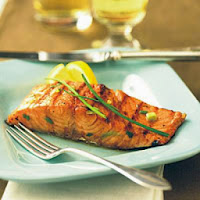Salmon is another good food to fight inflammation. The reason? Salmon is loaded with eicosapentaenoic acid. This acid is an omega-3 fat that lowers inflammation. Omega-3 fats are healthy fats that many of us do not get enough of.
There are many ways to enjoy salmon. Grilled, poached, seared. tacos, salads, sandwiches, patties, in pasta dishes. I'm sure there are more but in full disclosure, I do not eat seafood. Yes, I do know that I should eat it. I just can't get it down.



















